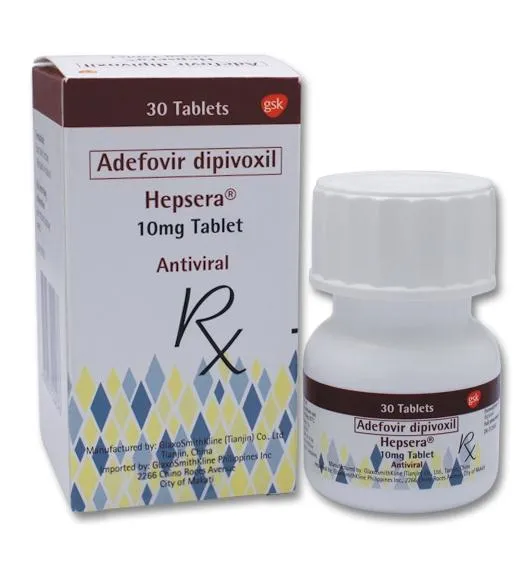Comprehensive Guide to Adefovir: Uses, Dosage, Side Effects, and More
What is Adefovir?
Overview of Adefovir
Generic Name: Adefovir (Adefovir dipivoxil, prodrug form)
Brand Name: Hepsera, generics
Drug Group: Antiviral; nucleotide analog reverse transcriptase inhibitor
The drug is used to
- Treat chronic hepatitis B with active viral replication and evidence of liver damage or compensated cirrhosis.
- Manage lamivudine-resistant HBV infections.
- Off-label uses include treatment of HBV in specific populations (e.g., HIV/HBV co-infection) under specialist guidance.
Key Characteristics
Form: Oral tablets (10 mg).
Mechanism: Inhibits HBV DNA polymerase, preventing viral DNA synthesis.
Approval: FDA-approved (2002 for Hepsera) and EMA-approved for chronic hepatitis B.

Indications and Uses of Adefovir
Adefovir is indicated for
Chronic Hepatitis B: Treats adults with chronic HBV infection, evidenced by elevated HBV DNA levels, alanine aminotransferase (ALT), or histological liver damage.
Lamivudine-Resistant HBV: Manages HBV strains resistant to lamivudine, reducing viral load.
Compensated Cirrhosis: Used in HBV patients with stable liver function to prevent disease progression.
Off-Label Uses: May be used in HIV/HBV co-infection or post-liver transplant HBV recurrence under specialist supervision.
Dosage of Adefovir
Dosage for Adults
Chronic Hepatitis B:
- Standard: 10 mg orally once daily, with or without food.
- Duration: Long-term, often years, based on viral suppression and liver function.
Lamivudine-Resistant HBV: Same as standard dosing, with monitoring for resistance.
Dosage for Children
Not approved for pediatric use; limited data exist for off-label use in adolescents under specialist oversight.
Dosage for Pregnant Women
Pregnancy Category C: Limited data; use only if benefits outweigh risks, as animal studies suggest potential fetal harm. Consult a hepatologist.
Dosage Adjustments
Renal Impairment:
- CrCl 20–49 mL/min: 10 mg every 48 hours.
- CrCl 10–19 mL/min: 10 mg every 72 hours.
- Hemodialysis: 10 mg every 7 days post-dialysis.
Hepatic Impairment: No adjustment needed for compensated liver disease; monitor closely in decompensated cirrhosis.
Resistance: Switch or combine with other antivirals (e.g., tenofovir) if resistance develops.
Additional Considerations
- Monitor renal function (creatinine clearance) and HBV DNA levels every 3–6 months.
- Take consistently at the same time daily to maintain steady-state levels.
How to Use Adefovir
Administration: Take the medication orally as a 10 mg tablet, with or without food. Swallow whole with water.
Timing: Administer once daily (or as adjusted for renal impairment) at a consistent time to optimize efficacy.
Missed Dose: Take as soon as remembered unless it’s nearly time for the next dose; do not double doses. Consult your doctor if multiple doses are missed.
Additional Tips:
- Continue therapy even if feeling well, as stopping prematurely may lead to HBV flare or resistance.
- Report symptoms like fatigue, nausea, or dark urine immediately, as they may indicate liver or kidney issues.
Contraindications for Adefovir
The drug is contraindicated in:
Patients with hypersensitivity to Adefovir or its components.
Those with severe renal impairment (CrCl <10 mL/min) unless on dialysis.
Patients with untreated HIV/HBV co-infection, as Adefovir monotherapy may cause HIV resistance.
Warnings & Precautions for Adefovir
General Warnings
Nephrotoxicity: Risk of renal impairment, including proximal renal tubulopathy; monitor creatinine clearance and serum creatinine regularly.
HBV Resistance: Prolonged use may lead to resistant HBV strains; monitor HBV DNA levels and consider combination therapy.
Hepatic Flares: Stopping the medication abruptly may cause severe HBV exacerbation; taper under medical supervision.
Lactic Acidosis and Hepatomegaly: Rare but serious; associated with steatosis, particularly in patients with risk factors.
HIV Resistance: In HIV/HBV co-infected patients, test for HIV before starting therapy to avoid resistance.
Use in Specific Populations
Pregnancy: Category C; avoid unless essential due to limited data. Use contraception during therapy.
Breastfeeding: Unknown if excreted in breast milk; avoid breastfeeding to prevent infant exposure.
Elderly: Increased risk of renal impairment; monitor renal function closely.
Children: Not approved; safety data are limited.
HIV/HBV Co-Infection: Use with effective HIV therapy to prevent resistance.
Additional Precautions
- Inform your doctor about kidney disease, HIV status, or other antiviral treatments.
- Avoid alcohol to reduce liver stress during HBV treatment.
Overdose and Management of Adefovir
Overdose Symptoms
Overdose is rare but may cause:
- Severe nausea, vomiting, or diarrhea.
- Renal dysfunction (e.g., elevated creatinine, decreased urine output).
- Liver toxicity (e.g., jaundice, elevated ALT).
Immediate Actions
Contact Healthcare Provider: Seek medical advice immediately.
Supportive Care: Manage symptoms (e.g., fluids for dehydration, dialysis for renal failure).
Monitor: Check renal and liver function tests for toxicity.
Additional Notes
- Overdose risk is low with proper dosing; store securely to prevent misuse.
- Report persistent symptoms promptly.
Side Effects of Adefovir
Common Side Effects
- Asthenia (fatigue; 13%)
- Headache (9%)
- Nausea (5%)
- Abdominal pain (9%)
- Elevated creatinine (2–4%)
These effects are usually mild and may decrease with continued use.
Serious Side Effects
Seek immediate medical attention for:
Renal Toxicity: Decreased urine output, swelling, or fatigue.
Hepatic Flares: Jaundice, dark urine, or right-sided abdominal pain.
Lactic Acidosis: Muscle pain, weakness, or rapid breathing.
Allergic Reactions: Rare; rash, hives, or difficulty breathing.
Additional Notes
- Regular monitoring of renal and liver function is critical, especially in long-term use.
- Report any new or worsening symptoms promptly.
Drug Interactions with Adefovir
The medication may interact with:
Nephrotoxic Drugs (e.g., NSAIDs, Aminoglycosides): Increase risk of renal impairment; monitor renal function closely.
Tenofovir: Concurrent use may increase nephrotoxicity; avoid unless necessary.
Lamivudine, Entecavir: No significant interactions; often used in combination for resistant HBV.
Probenecid: May increase Adefovir levels; monitor for toxicity.
Patient Education or Lifestyle
Medication Adherence: Take Adefovir consistently as prescribed to maintain viral suppression. Refill prescriptions early to avoid interruptions.
Monitoring: Attend regular appointments for renal function (creatinine clearance) and HBV DNA testing every 3–6 months.
Lifestyle: Avoid alcohol to reduce liver damage risk. Maintain a balanced diet to support liver health.
HBV Prevention: Use barrier methods (e.g., condoms) to prevent HBV transmission to others.
Kidney Health: Stay hydrated and avoid nephrotoxic substances (e.g., excessive NSAIDs).
Emergency Awareness: Report signs of renal issues (e.g., swelling) or liver flares (e.g., jaundice) immediately.
Pharmacokinetics of Adefovir
Absorption: Adefovir dipivoxil is a prodrug, rapidly converted to Adefovir; bioavailability ~59%. Peak plasma concentration at 0.6–4 hours.
Distribution: Volume of distribution ~0.4 L/kg; minimal protein binding.
Metabolism: Minimal hepatic metabolism; converted to active Adefovir via esterases.
Excretion: Primarily renal (45% as unchanged drug); clearance reduced in renal impairment.
Half-Life: ~7 hours (prolonged in renal impairment).
Pharmacodynamics of Adefovir
The drug exerts its effects by:
Inhibiting HBV DNA polymerase, blocking viral DNA synthesis and replication.
Reducing HBV viral load, improving liver histology in chronic hepatitis B.
Exhibiting activity against lamivudine-resistant HBV mutants.
Having minimal impact on human DNA polymerases, reducing host toxicity.
Storage of Adefovir
Temperature: Store at room temperature (20–25°C or 68–77°F); avoid moisture and heat.
Protection: Keep in original container to protect from light.
Safety: Store out of reach of children to prevent accidental ingestion.
Disposal: Follow local regulations or consult a pharmacist for safe disposal of unused or expired medication.
Frequently Asked Questions (FAQs)
Q: What does Adefovir treat?
A: The drug treats chronic hepatitis B with active viral replication or lamivudine resistance.
Q: Can Adefovir cure hepatitis B?
A: No, the medication suppresses HBV but does not cure it.
Q: Is Adefovir safe for kidney disease patients?
A: Requires dose adjustments; avoid in severe renal impairment unless on dialysis.
Q: How long is Adefovir treatment needed?
A: Often long-term (years) to maintain viral suppression; follow your doctor’s guidance.
Q: Can Adefovir cause kidney problems?
A: Yes, nephrotoxicity is a risk; regular renal monitoring is essential.
Regulatory Information
The medication is approved by:
U.S. Food and Drug Administration (FDA): Approved in 2002 (Hepsera) for chronic hepatitis B.
European Medicines Agency (EMA): Approved for chronic hepatitis B with active replication.
Other Agencies: Approved globally for similar indications; consult local guidelines.
References
- U.S. Food and Drug Administration (FDA). (2023). Hepsera (Adefovir Dipivoxil) Prescribing Information.
- Official FDA documentation detailing the drug’s approved uses, dosage, and safety for hepatitis B.
- European Medicines Agency (EMA). (2023). Hepsera (Adefovir Dipivoxil) Summary of Product Characteristics.
- EMA’s comprehensive information on the medication’s indications and precautions in Europe.
- National Institutes of Health (NIH). (2023). Adefovir: MedlinePlus Drug Information.
- NIH resource providing detailed information on the drug’s uses, side effects, and precautions.
- World Health Organization (WHO). (2023). WHO Model List of Essential Medicines: Adefovir.
- WHO’s inclusion of Adefovir as an essential medicine for hepatitis B.
- Hepatology. (2018). Adefovir in the Management of Chronic Hepatitis B.
- Peer-reviewed article on the medication’s efficacy in HBV (note: access may require a subscription).
